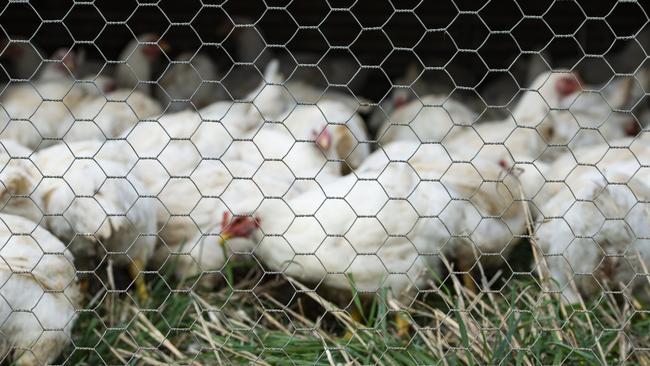‘Offensively opportunistic’: Chicken farmers targeted by new animal activist campaign
Alliance for Animals Australia has launched a national campaign calling for improved welfare standards for chickens farmed for their meat.
An animal welfare campaign targeting chicken farmers is the latest threat to an industry battling outbreaks of avian influenza and a concentration of processors pushing a record number of growers out of business.
The Australian Alliance for Animals has launched a national campaign in partnership with World Animal Protection and New Zealand’s Animals Aotearoa calling on businesses to commit to higher chicken welfare standards.
So far Domino’s has signed up, as well as meat kit businesses Marley Spoon and HelloFresh, and The Coffee Club in New Zealand.
Signatories to the ‘Better Chicken Commitment’ promise to source chicken that has been produced according to a list of welfare standards drawn up by AAA.
Those standards focus on using chicken breeds that have a slower growth rate to the most commonly used commercial chicken breeds, improved living conditions such as a maximum stocking density of 30kg per square metre and death either from effective electrical stunning or controlled atmosphere stunning.
Currently most chickens in Australia are hung by their feet, rendered unconscious with carbon dioxide and decapitated.

Australian Chicken Meat Federation acting chief executive Joanne Sillince said the campaign was offensively opportunistic and a cover-up for their ultimate agenda, which was an end to all meat consumption.
“The frustrating part is farmers have spent since the 1950s improving animal welfare and their care of the animals and the result is the best chicken meat in the world,” Dr Sillince said.
“There is a time and a place for activism … Talk about kicking farmers when they’re down.”
Farmers have been grappling with the spread of low pathogenic avian influenza, which has been detected at eight farmers across NSW, Victoria and the ACT since May and involves the euthanising of all birds at the affected properties.
Meanwhile the chicken meat industry is one of the nation’s most highly concentrated markets, with just one of two processors in each of the main farming regions. This leaves producers with no choice but to sign up to allegedly restrictive deals to process their birds.
AAA co-founder Bidda Jones it was time “for Aussie chickens to get a better life”.
“Modern chickens are genetically selected to grow too big and fast for their own bodies to handle. They don’t get enough space, light, or clean air and, sadly, many will endure a very stressful, painful death. We want this to change,” Dr Jones said.
“This campaign is about shedding light on the realities of the chicken industry and giving consumers and businesses alike a pathway to improve the lives of millions of Aussie chickens.”
A spokesman from the RSPCA said the organisation welcomed any measure to improve the welfare of chickens raised for meat, including the Better Chicken Commitment.
“All of the areas outlined in the Better Chicken Commitment – including stocking density, welfare issues from genetic selection for rapid growth, environmental standards including light, perch provision and air quality, stunning methods – are very serious welfare concerns for meat chickens,” he said.
Some measures differ little from the RSPCA’s own requirements, such as a maximum stocking density of 34kg per square metre, compared to the BCC’s 30kg per square metre. Ammonia levels must not exceed 15 ppm in RSPCA approved sheds, which is lower than the AAA’s requirement of a minimum reading of 20 ppm.
The RSPCA says about 92 per cent of meat chickens in Australia are farmed to its standard.





